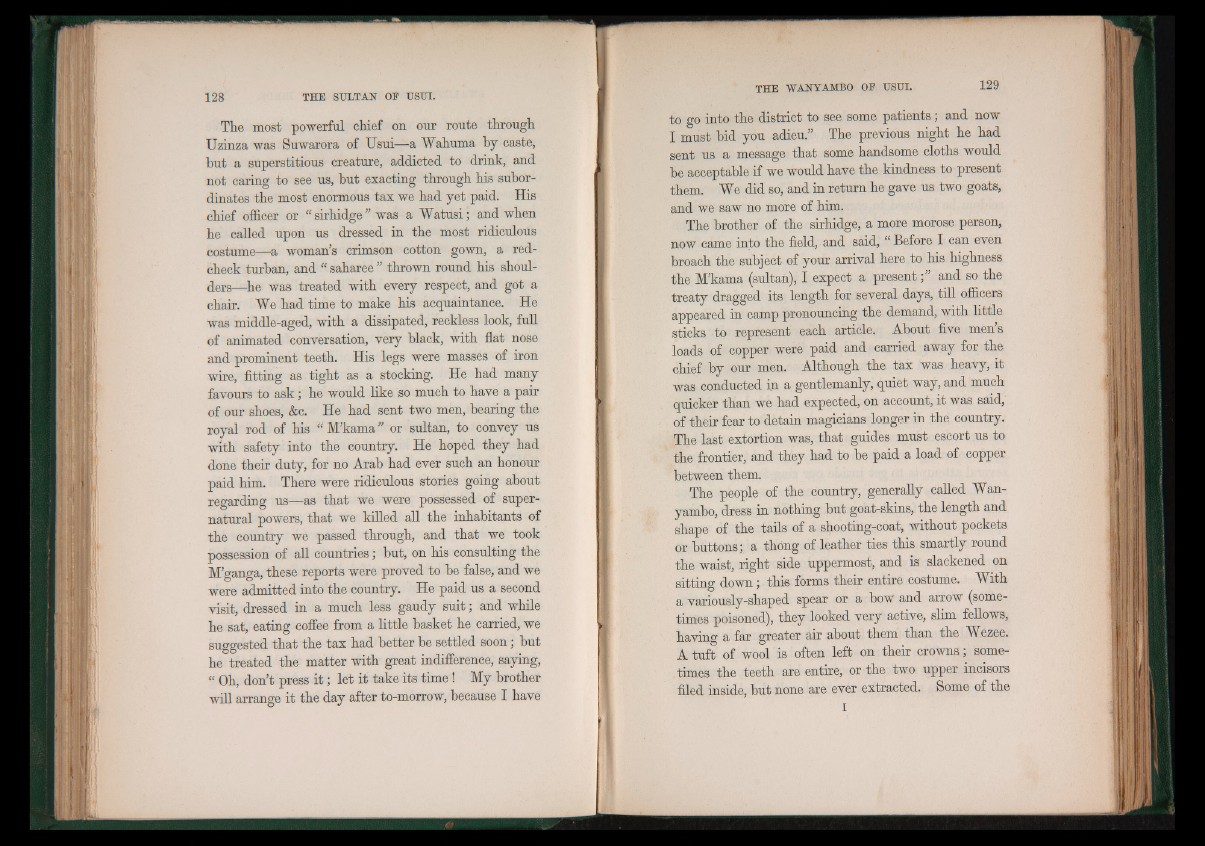
The most powerful chief on our route through
Uzinza was Suwarora of Usui—a Wahuma by caste,
but a superstitious creature, addicted to drink, and
not caring to see us, but exacting through his subordinates
the most enormous tax we had yet paid. His
chief officer or “ sirhidge ” was a Watusi; and when
he called upon us dressed in the most ridiculous
costume—a woman’s crimson cotton gown, a red-
check turban, and “ saharee ” thrown round his shoulders—
he was treated with every respect, and got a
chair. We had time to make his acquaintance. He
was middle-aged, with a dissipated, reckless look, full
of animated conversation, very black, with flat nose
and prominent teeth. His legs were masses of iron
wire, fitting as tight as a stocking. He had many
favours to ask; he would like so much to have a pair
of our shoes, &c. He had sent two men, bearing the
royal rod of his “ M’kama” or sultan, to convey us
with safety into the country. He hoped they had
done their duty, for no Arab had ever such an honour
paid him. There were ridiculous stories going about
regarding us—as that we were possessed of supernatural
powers, that we killed all the inhabitants of
the country we passed through, and that we took
possession of all countries; but, on his consulting the
M’ganga, these reports were proved to be false, and we
were admitted into the country. He paid us a second
visit, dressed in a much less gaudy suit; and while
he sat, eating coffee from a little basket he earned, we
suggested that the tax had better be settled soon; but
he treated the matter with great indifference, saying,
“ Oh, don’t press i t ; let it take its time ! My brother
will arrange it the day after to-morrow, because I have
to go into the district to see some patients; and now
I must bid you adieu.” The previous night he had
sent us a message that some handsome cloths would
be acceptable if we would have the kindness to present
them. We did so, and in return he gave us two goats,
and we saw no more of him.
The brother of the sirhidge, a more morose person,
now came into the field, and said, “Before I can even
broach the subject of your arrival here to his highness
the M’kama (sultan), I expect a p r e s e n t a n d so the
treaty dragged its length for several days, till officers
appeared in camp pronouncing the demand, with little
sticks to represent each article. About five men’s
loads of copper were paid and carried away for the
chief by our men. Although the tax was heavy, it
was conducted in a gentlemanly, quiet way, and much
quicker than we had expected, on account, it was said,
of their fear to detain magicians longer in the country.
The last extortion was, that guides must escort us to
the frontier, and they had to be paid a load of copper
between them.
The people of the country, generally called Wan-
yambo, dress in nothing but goat-skins, the length and
shape of the tails of a shooting-coat, without pockets
or buttons; a thong of leather ties this smartly round
the waist, right side uppermost, and is slackened on
sitting down; this forms their entire costume. With
a variously-shaped spear or a bow and arrow (sometimes
poisoned), they looked very active, slim fellows,
having a far greater air about them than the 'Wezee.
A tuft of wool is often left on their crowns; sometimes
the teeth are entire, or the two upper incisors
filed inside, but none are ever extracted. Some of the
I